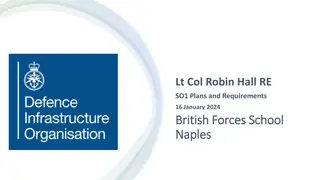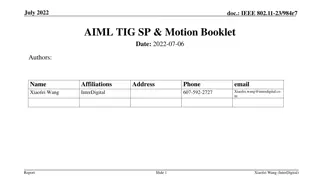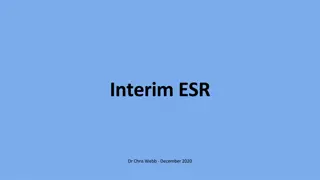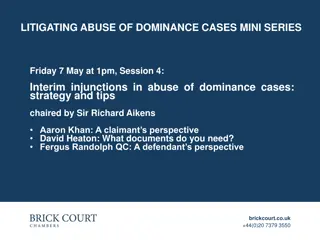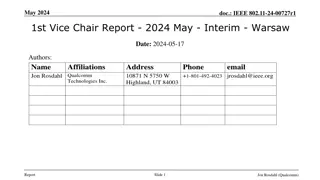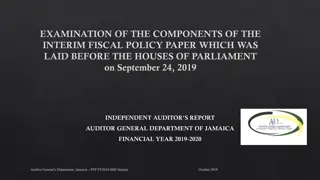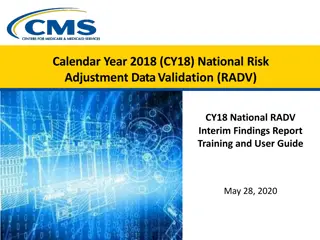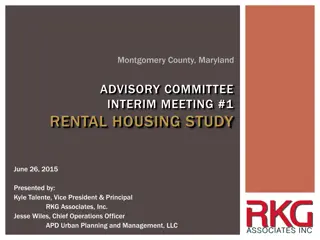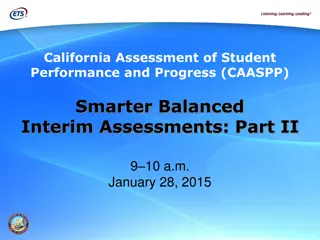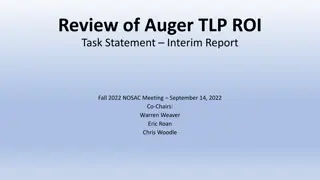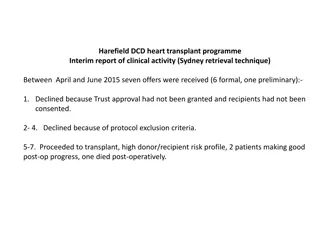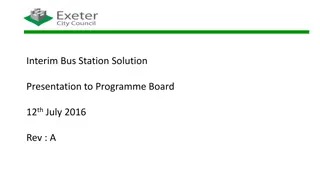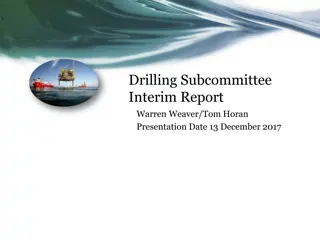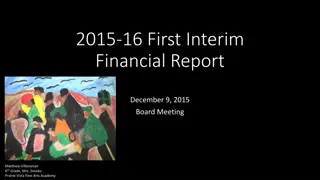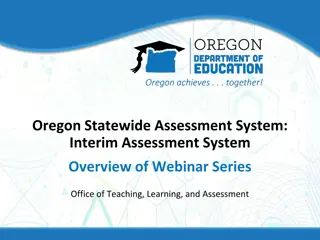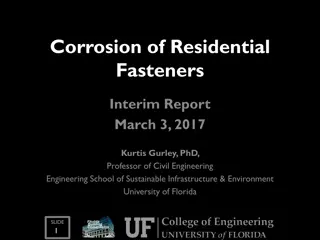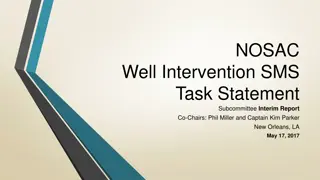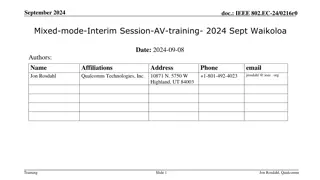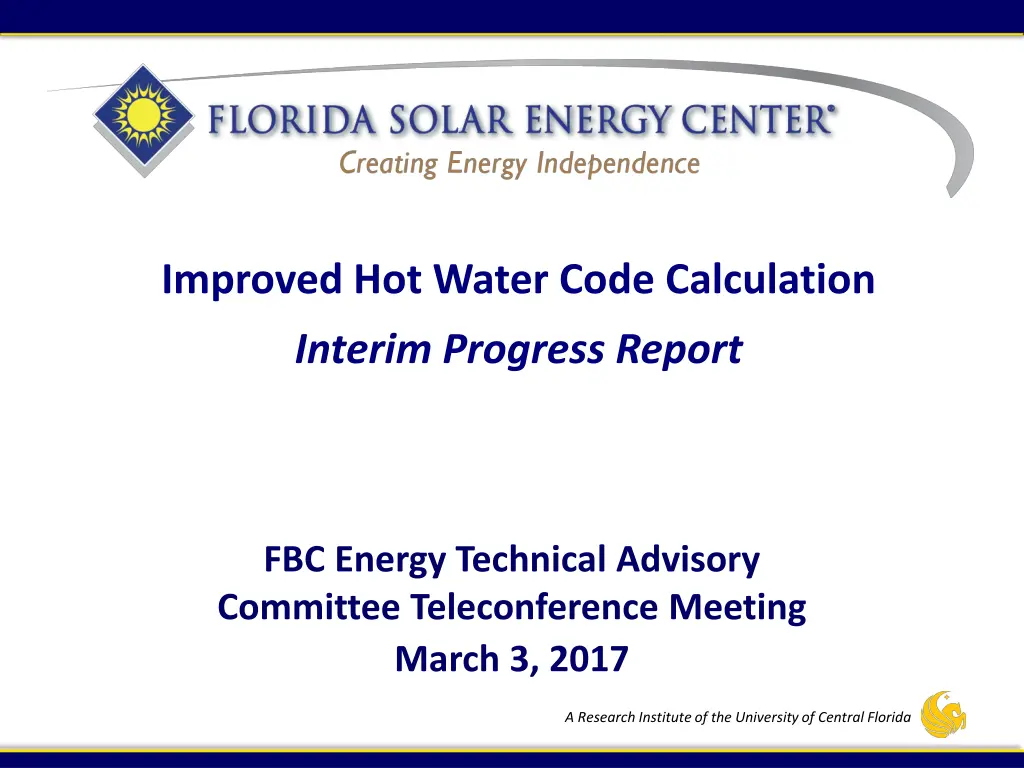
Florida Hot Water Energy Research and Recommendations
This research project conducted by the Florida Solar Energy Center aims to characterize hot water waste sources, investigate climatic influences on hot water usage, and evaluate energy impacts of recirculation systems in Florida homes. The study will provide Florida-specific methods for energy code calculations and offer recommendations for more effective domestic hot water systems.
Download Presentation

Please find below an Image/Link to download the presentation.
The content on the website is provided AS IS for your information and personal use only. It may not be sold, licensed, or shared on other websites without obtaining consent from the author. If you encounter any issues during the download, it is possible that the publisher has removed the file from their server.
You are allowed to download the files provided on this website for personal or commercial use, subject to the condition that they are used lawfully. All files are the property of their respective owners.
The content on the website is provided AS IS for your information and personal use only. It may not be sold, licensed, or shared on other websites without obtaining consent from the author.
E N D
Presentation Transcript
Improved Hot Water Code Calculation Interim Progress Report FBC Energy Technical Advisory Committee Teleconference Meeting March 3, 2017 A Research Institute of the University of Central Florida
Research Purpose and Goal Characterize hot water waste sources Characterize implications of climatic differences on hot water use Characterize energy impacts of hot water recirculation systems and controls with respect to energy consumption in Florida homes Recommend Florida-specific methods to employ in the Florida Energy Code for residential hot water use and energy consumption calculations 2 FLORIDA SOLAR ENERGY CENTER A Research Institute of the University of Central Florida
Hot Water Systems Research Principal factors not adequately considered by standard building energy code hot water calculations: Variation in service water temperatures by climate location Hot water system design significantly impacts both the quantity of hot water used and energy consumption Hot water circulation pumps can reduce hot water use but also dramatically increase energy use 3 FLORIDA SOLAR ENERGY CENTER A Research Institute of the University of Central Florida
Expected Outcome and Impact on the Code Project report will include recommendations suitable for consideration by the FBC in determining the most appropriate Florida- specific methods, procedure and calculation for determining the energy use effectiveness of domestic hot water systems for the residential FEC. 4 FLORIDA SOLAR ENERGY CENTER A Research Institute of the University of Central Florida
Research Approach Four project tasks: Task 1: A hot water and energy search terms literature review Task 2: Development of hot water energy use calculation procedures by month, climate, circulation design and hot water system type 5 FLORIDA SOLAR ENERGY CENTER A Research Institute of the University of Central Florida
Research Approach Four project tasks (cont.): Task 3: Compare hot water energy use for 2, 3, and 4-bedroom homes in Miami, Orlando and Jacksonville calculated with new procedures vs. use determined by current code calculation Task 4: Using EnergyGauge simulations, determine and document the difference in overall energy code performance scores for two sample homes (hot water e-Ratios and total e-Ratios) 6 FLORIDA SOLAR ENERGY CENTER A Research Institute of the University of Central Florida
Progress to Date Task 1 literature review listing provided with interim report Task 2 calculation procedures developed (draft interactive Excel sheet and draft code modification language provided with interim report) 7 FLORIDA SOLAR ENERGY CENTER A Research Institute of the University of Central Florida
Progress to Date Literature Review: Searched on "hot water distribution" and "energy" terms in NREL, LBNL, ASHRAE and DOE BA databases + general search + other 40+ pertinent documents identified Review to date shows: Anticipated levels of waste Anticipated use factors including plumbing design, insulation, climate (time of year and location) and occupant demographics 8 FLORIDA SOLAR ENERGY CENTER A Research Institute of the University of Central Florida
Progress to Date Calculation Procedure Development: Starting point was ANSI/RESNET 301-2014 Addendum A-2015 Florida-specific adaptations include: Calculation by month Florida climate adjustment (Tmains and Fmix) FL climate examples: Tallahassee, Jacksonville, Daytona Beach, Orlando, Tampa and Miami 9 FLORIDA SOLAR ENERGY CENTER A Research Institute of the University of Central Florida
Progress to Date Calculation Procedure Development: Starting point was ANSI/RESNET 301-2014 Addendum A-2015 Florida-specific adaptations include: Calculation by month Florida climate adjustment (Tmains and Fmix) FL climate examples: Tallahassee, Jacksonville, Daytona Beach, Orlando, Tampa and Miami Solar and HRUs addressed upstream 10 FLORIDA SOLAR ENERGY CENTER A Research Institute of the University of Central Florida
Progress to Date Interactive Hot Water System Calculator (Draft) 11 FLORIDA SOLAR ENERGY CENTER A Research Institute of the University of Central Florida
Progress to Date Proposed Code Change Language (Draft) 12 FLORIDA SOLAR ENERGY CENTER A Research Institute of the University of Central Florida
Next Steps Task 3: Compare hot water energy use for 2, 3, and 4-bedroom homes in Miami, Orlando and Jacksonville calculated with new procedures vs. use determined by current code calculation Task 4: Using EnergyGauge simulations, determine and document the difference in overall energy code performance scores for two sample homes 13 FLORIDA SOLAR ENERGY CENTER A Research Institute of the University of Central Florida
Project Completion Literature review summary Document Task 3 and 4 results Final report delivered by June 1st 14 FLORIDA SOLAR ENERGY CENTER A Research Institute of the University of Central Florida

